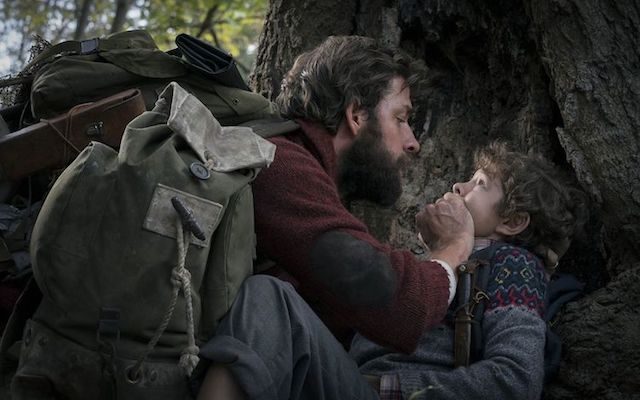
As a proponent of the “shut up and watch the movie” school of thought, I have a special fondness for films that actively encourage silence. The tense and thrilling “A Quiet Place” does it by putting its characters in a situation where making noise is fatal and then making us forget that it’s only a movie. Viewers with limited lung capacity, be advised that you’ll be holding your breath a lot.
A few years from now, humanity is bedeviled by vicious reptilian monsters that are seemingly indestructible, their one weakness — total blindness — compensated for by an extraordinary sense of hearing. Nonetheless, if you don’t make any noise, they can’t find you. We join the story some months after the initial invasion, the details conveyed to us through the convenient exposition-delivery system of Newspaper Clippings on a Bulletin Board Annotated by Obsessed Researcher. That’s Lee (John Krasinski, who also directed), who lives with his wife, Evelyn (Emily Blunt), and their children Regan (Millicent Simmonds) and Marcus (Noah Jupe) on an isolated (and now mostly sound-proofed) farm in upstate New York. Fortuitously — some might say conveniently — Regan is deaf, so the family already knew sign language and didn’t have to learn it when speaking aloud became deadly. The families that didn’t know how to communicate silently must have been first to die.
But there was a tragedy in the prologue, for which Regan blames herself (accurately) and fears her father no longer loves her. It isn’t so, of course; her father actually spends much of his time in the basement tinkering with hearing aids in the hopes of reversing her deafness. The family has lived like this — walking barefoot on sand-covered paths, communicating in gestures and signs, replacing hard Monopoly tokens with soft ones — for more than a year, but they seem optimistic that the crisis is not permanent, or that if it is, they can manage. There’s no better indication of their hopefulness than the fact that Evelyn is due to give birth any day. We have no record of whether the pregnancy was planned, whether any efforts were made to prevent or abort it, but Evelyn and Lee’s behavior suggests that it is very much wanted now and that the work necessary to prepare for its arrival is done out of love.
There’s very little dialogue, of course, so Krasinski (finally directing a good movie after his awful “Brief Interviews with Hideous Men” and “The Hollars”) uses the camera to focus our attention. It shouldn’t surprise us that a man best known for his wordless reactions on “The Office” has made a movie that hinges on nonverbal communication, but it’s impressive how well the former Jim Halpert pulls it off, aided by Bryan Woods and Scott Beck’s efficient screenplay (which Krasinski revised). We understand all the ways the family’s situation is fraught with peril without needing to have them spelled out. Childbirth is loud! Babies are loud! Regan’s deafness has advantages as well as disadvantages! The film regularly sets up details whose significance isn’t initially clear, trusting us to wait until it is. We learn the “rules” of this world, how quiet you need to be, when it’s safe to make noise (when there’s a louder noise drowning you out).
We should also mention the excellent work by sound editors Erik Aadahl and Ethan Van der Ryn, who put us on edge by amplifying the tiny sounds of everyday life. (Stop breathing! They’ll hear you!) When a shot is from Regan’s point of view, the sound drops out entirely, which somehow makes us even more nervous. (She won’t hear the creatures approaching!) There is a musical score, by Marco Beltrami, but Krasinski uses it judiciously to relieve tension (extraneous noise implies that we’re safe for now) and to ratchet up the adrenaline in the scenes where all hell has broken loose and silence no longer matters.
This is ultimately about a family’s resilience and dedication to one another (the real quiet place … was love), with each of the four family members given a crucial role in the fight, everyone required to sacrifice something. The resolution is maybe a little too convenient (there’s that word again), almost cute, though not enough to squander the terrific premise, and the movie ends on a perfect note that outweighs any prior missteps. See it with someone you love who is also quiet, if you know anybody like that.
B+ (1 hr., 30 min.; )





